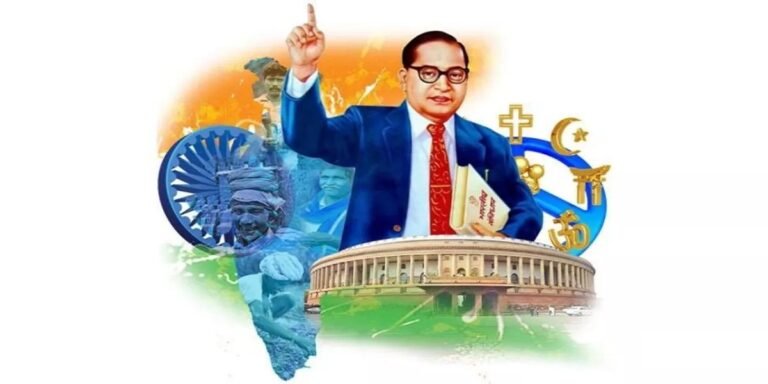The Life and Legacy of Bhimrao Ramji Ambedkar

Born on April 14, 1891, in the town of Mhow in the Central Provinces of British India, Bhimrao Ambedkar faced discrimination and social exclusion from an early age. As a member of the Dalit community, formerly known as “untouchables,” he experienced firsthand the harsh realities of caste-based discrimination that plagued Indian society.
Despite facing numerous obstacles, Ambedkar’s determination and intellectual prowess propelled him to excel in his studies. He obtained a scholarship to study at Columbia University in the United States, where he earned multiple degrees, including a doctorate in economics. This educational journey abroad exposed him to different ideas and philosophies, shaping his worldview and igniting his passion for social justice.
Upon returning to India, Ambedkar dedicated his life to fighting for the rights of Dalits and other marginalized communities. He relentlessly advocated for their social, economic, and political empowerment, challenging the deeply entrenched caste system that had oppressed them for centuries.
One of Ambedkar’s most significant contributions was his pivotal role in drafting the Indian Constitution. As the chairman of the drafting committee, he played a crucial part in shaping the foundational principles and laws of the newly independent nation. His vision for a just and egalitarian society is reflected in the Constitution’s provisions that guarantee equality, justice, and affirmative action for disadvantaged groups.
In addition to his work on the Constitution, Ambedkar spearheaded the Dalit Buddhist movement, which sought to liberate Dalits from the shackles of Hindu caste hierarchy. He believed that Buddhism offered a path to liberation and equality, free from the oppressive caste system. Ambedkar himself converted to Buddhism in 1956, along with thousands of his followers, in a historic ceremony in Nagpur.

Ambedkar’s legacy extends far beyond his lifetime. His tireless efforts paved the way for significant social reforms and laid the foundation for the empowerment of Dalits in India. His ideas continue to inspire generations of activists and scholars, both in India and around the world, in their fight against discrimination and inequality.
Bhimrao Ramji Ambedkar remains an iconic figure in Indian history, revered as the architect of social justice and a champion of human rights. His life and work serve as a reminder of the power of individuals to challenge oppressive systems and strive for a more inclusive and equitable society.
Ambedkar’s early life and education played a crucial role in shaping his future as a social and political reformer. Despite being born into a lower caste, he defied societal expectations and excelled in his studies. His determination and intellectual prowess allowed him to overcome the barriers imposed by the rigid Hindu social hierarchy.
After completing his undergraduate studies at Elphinstone College, Ambedkar’s academic achievements caught the attention of scholars and educators. Recognizing his potential, he was awarded a scholarship to pursue further studies abroad. This opportunity opened doors for him to gain a deeper understanding of economics and law, two fields that would become instrumental in his fight against social injustice.
Ambedkar’s journey took him to Columbia University, where he pursued a degree in economics. The exposure to diverse perspectives and rigorous academic environment broadened his horizons and honed his analytical skills. His time at Columbia University allowed him to engage with leading economists and intellectuals, further enriching his understanding of economic theories and their implications for society.
Building on the foundation laid at Columbia, Ambedkar continued his academic pursuit at the London School of Economics, where he earned a doctorate in economics. This accomplishment was extraordinary, considering the limited opportunities available to individuals from marginalized communities at the time. Ambedkar’s doctoral research delved into the economic and social conditions of the marginalized sections of Indian society, providing valuable insights into the structural inequalities that perpetuated their oppression.

However, Ambedkar’s thirst for knowledge did not end with economics. He recognized the significance of the law as a tool for advocating for social justice and equality. To further his understanding of legal principles, he studied law at Gray’s Inn in London and was called to the bar in 1922. This legal training equipped him with the necessary skills to challenge discriminatory laws and fight for the rights of the oppressed.
Ambedkar’s multidisciplinary education in economics and law positioned him as a formidable force in his quest to dismantle the oppressive caste system and advocate for the rights of the marginalized. Armed with academic expertise and a deep understanding of the socio-economic dynamics of Indian society, he embarked on a lifelong mission to bring about social reform and create a more equitable and just society.
Ambedkar’s role in the Indian independence movement extended beyond his work on the Constitution and his position as Law and Justice Minister. He was a vocal advocate for social and political reform, tirelessly fighting against caste discrimination and advocating for the rights of the oppressed.
One of Ambedkar’s most significant contributions to the independence movement was his leadership in the Dalit movement. He founded the Bahishkrit Hitakarini Sabha in 1924, an organization dedicated to the welfare and upliftment of the Dalit community. Through this organization, Ambedkar worked to empower Dalits and challenge the oppressive caste system that had plagued Indian society for centuries.
Ambedkar’s efforts to uplift the Dalit community were not limited to political activism. He also focused on education and social reform as means to combat discrimination and inequality. In 1956, he converted to Buddhism, along with thousands of his followers, as a way to reject the caste system and embrace a religion that emphasized equality and social justice.
Ambedkar’s contributions to the Indian independence movement were not without controversy. His radical ideas and fierce criticism of Hinduism and the caste system often drew backlash from conservative forces. However, his unwavering commitment to social justice and his ability to articulate the grievances of the marginalized communities made him a powerful figure in the fight for independence.
Despite facing numerous obstacles and opposition, Ambedkar’s legacy as a champion of social justice and equality continues to inspire generations of activists and leaders in India and beyond. His work laid the foundation for a more inclusive and equitable society, and his ideas continue to shape the discourse on caste, discrimination, and human rights in modern India.
The Dalit Buddhist Movement
Ambedkar’s disillusionment with Hinduism and its caste-based discrimination led him to renounce the religion and embrace Buddhism. On October 14, 1956, he converted to Buddhism along with thousands of his followers in a historic event known as the Mass Conversion Ceremony.
Ambedkar saw Buddhism as a path towards liberation and equality. He believed that by embracing Buddhism, Dalits could escape the oppressive caste system and attain spiritual and social emancipation. The Dalit Buddhist movement, inspired by Ambedkar’s teachings, continues to thrive today, empowering Dalits and promoting social justice.
The Dalit Buddhist movement, which gained momentum after Ambedkar’s conversion, has played a significant role in reshaping the social and political landscape of India. It has provided a platform for Dalits to reclaim their identity, challenge the entrenched caste hierarchy, and demand equal rights and opportunities.

One of the key aspects of the movement is the emphasis on education and empowerment. Ambedkar believed that education was crucial for the upliftment of Dalits and their liberation from the shackles of caste discrimination. As a result, the movement has established numerous educational institutions, ranging from schools to universities, to provide quality education to Dalit students.
These educational institutions not only impart knowledge but also instill a sense of pride and self-confidence among Dalit students. They serve as safe spaces where Dalits can freely express their ideas, challenge social norms, and develop leadership skills. Through education, the Dalit Buddhist movement aims to break the cycle of generational poverty and empower Dalits to become agents of change in their communities.
In addition to education, the movement also focuses on social and economic empowerment. It advocates for land reforms, access to resources, and economic opportunities for Dalits. By fighting for economic justice, the movement aims to address the systemic inequalities that have marginalized Dalits for centuries.
The Dalit Buddhist movement has also been instrumental in raising awareness about the rights and dignity of Dalits. Through various forms of activism, such as protests, rallies, and advocacy campaigns, the movement has brought the issue of caste discrimination to the forefront of national and international discourse. It has challenged the prevailing narrative of caste as a religious or cultural issue and instead framed it as a human rights violation.
Furthermore, the movement has fostered a sense of solidarity among Dalits across different regions and castes. It has created a platform for Dalits to come together, share their experiences, and collectively work towards social change. This unity has been crucial in challenging the deeply entrenched social hierarchy and demanding equal rights and opportunities for all Dalits.
In conclusion, the Dalit Buddhist movement, inspired by Ambedkar’s teachings, has emerged as a powerful force for social justice in India. Through education, empowerment, activism, and solidarity, the movement aims to dismantle the caste system and create a society based on equality and dignity for all.
Legacy and Recognition
Babasaheb Ambedkar’s contributions to the upliftment of marginalized communities and his relentless struggle for social justice have earned him immense respect and recognition. His tireless efforts have left an indelible mark on the history of India and continue to inspire generations of activists, scholars, and social reformers.

In 1990, the Government of India posthumously conferred upon him the Bharat Ratna, the country’s highest civilian award, in recognition of his exceptional achievements. The title of Bharat Ratna, meaning “Jewel of India,” is a testament to Ambedkar’s invaluable contributions to the nation. This prestigious honor not only acknowledges his significant role in shaping the Indian Constitution but also recognizes his lifelong dedication to the cause of social justice.
Ambedkar’s followers and admirers honor him with the salutation “Jai Bhim,” which translates to “Hail Bhim.” This phrase, often used as a rallying cry by his supporters, symbolizes their reverence for his efforts in championing the rights of the oppressed. It serves as a reminder of the ongoing struggle for equality and the need to continue Ambedkar’s work in eradicating discrimination and oppression.
Babasaheb Ambedkar’s influence extends far beyond his lifetime. His teachings and ideas remain relevant in the ongoing fight against discrimination and inequality. He emphasized the importance of education and empowerment for marginalized communities, advocating for their social, economic, and political upliftment. His vision for an inclusive and just society continues to guide social reform movements and inspire individuals to work towards a more equitable future.
In conclusion, Bhimrao Ramji Ambedkar’s journey from a marginalized individual to a champion of social justice and equality serves as an inspiration to all. His contributions to the drafting of the Indian Constitution, his advocacy for Dalit rights, and his role in the Dalit Buddhist movement have left an indelible impact on the history of India. Babasaheb’s legacy serves as a reminder that the pursuit of justice and equality is a continuous endeavor that requires the collective efforts of society. As we strive to build a more inclusive world, we must draw inspiration from Ambedkar’s teachings and continue his fight for a society where every individual is treated with dignity and respect.